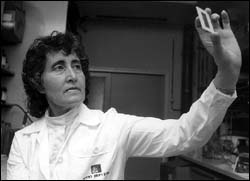Weizmann Institute researchers have identified the specific elements of a muscle receptor protein attacked by the immune system in myasthenia gravis, an autoimmune disease in which communication between nerves and muscles breaks down. In this presently incurable illness, white blood cells attack the muscle receptor charged with detecting the nerve-signaling chemical acetylcholine, leading to muscle weakness that can strike any part of the body but most commonly affects the eyes, face, lips and tongue.
In a recently published study, Prof. Edna Mozes of the Chemical Immunology Department has shown that patients with MG have white blood cells that are selectively activated by two specific protein fragments of the human acetylcholine receptor. These peptides could provide the basis for an early screening test or serve as a starting point for the design of potential treatments for this disease.
Prof. Mozes's lab was one of the first to demonstrate the key role that immune system T lymphocytes play in autoimmune attack that causes MG. An autoimmune process is triggered when lymphocytes recognize and attack normal body tissues. Ordinarily, these T cells respond only to foreign invaders, namely peptides derived from bacteria and viruses. In the rare but in sometimes fatal malady, whose best-known victim was Greek shipping magnate Aristotle Onassis, it is the nerve-muscle junction that is assaulted.
In a related study which may simplify the development of early screening tests for the disease, Prof. Mozes and Prof. Israel Pecht, of the same department, have designed a method to detect binding of these peptides to blood cells derived from either mice or MG patients. This approach, the first that enables laboratories to monitor the binding of peptides to live cells, could also help advance the development of tests and potential therapies for other autoimmune disorders, including juvenile diabetes, rheumatoid arthritis and Graves' disease.
These developments are an outgrowth of earlier studies by Prof. Sara Fuchs, also of the Department of Chemical Immunology, who was among the first researchers to demonstrate the involvement of the acetylcholine receptor in MG.
The method for detecting peptide binding to living cells has been patented by Yeda Research & Development Co., which is responsible for the commercial application of Weizmann Institute research.
Prof. Fuchs holds the Sir Ernst B. Chain Chair of Neuroimmunology; Prof. Mozes, the Heinrich G. Ritzel Chair of Immunology; and Prof. Pecht, the Jacque Mimran Chair of Chemical Immunology.

